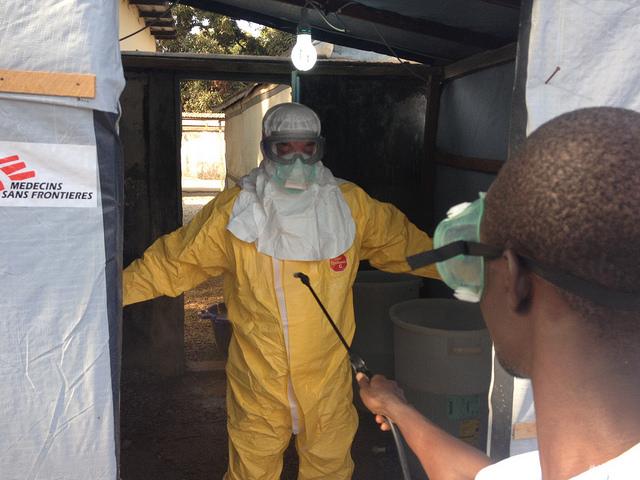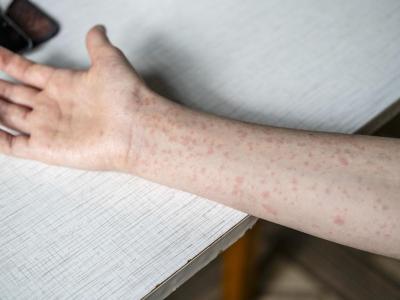Doctors without Borders (MSF) continues to tailor its response to the evolving Ebola situation in Liberia, opening a small isolation unit in Monrovia to help one of the city's major hospitals reopen and setting up another in a remote community where the burial of a patient from the capital sparked an outbreak.
Meanwhile, the World Health Organization (WHO) said today that the number of people infected by Ebola in the hardest hit countries has grown to 17,800, with the number of deaths rising to 6,331.
With today's report, Sierra Leone appears to have pulled ahead of Liberia as the country with the most cases. Liberia's data, however, are current as of Dec 3, while the Guinea and Liberia numbers are current as of Dec 6.
Today's report lists Sierra Leone's case total as 7,798, Liberia's as 7,719, and Guinea's as 2,283. Liberia still overwhelming leads with the highest number of deaths, 3,177. The WHO has warned that the case totals underestimate the true burden of the disease.
New transit units provide quick isolation
MSF said in a Dec 5 statement that it set up its new 10-bed Ebola transit unit in Monrovia near Redemption Hospital, near the crowded slum community of New Kru Town. It said the facility was closed for regular service in August, a blow to the community, because it is the only hospital in the area that offers free medical care.
The group said the transit facility will enable suspected Ebola patients who come to the hospital's reopened outpatient department to be quickly isolated, diagnosed, and referred to an Ebola treatment center, which provides the hospital with some breathing room to reopen safely to treat other conditions.
Sebastain Stein, MSF's Monrovia project coordinator, said in a statement, "We believe that infection control measures and triage points should be implemented urgently within regular health facilities. Not only to reduce the spread of Ebola, but also to stop people dying from preventable diseases and unmanaged complications."
MSF said since the transit unit opened in November, it has taken extra steps to introduce local people to the facility by giving community leaders tours of its low-risk zone and creating a specific area in the unit where patients can see and talk to their relatives.
Elsewhere, MSF has opened a temporary transit unit between Grand Bassa and Bong districts, following a recent outbreak in Qweineh, Liberia, according to an update today from the United Nations Mission for Ebola Emergency Response (UNMEER). Seven confirmed cases, six suspected ones, and seven deaths have occurred there after community members buried an Ebola patient from Monrovia.
UNMEER said MSF's temporary center has 10 beds for treating confirmed cases and 5 for managing suspected patients.
Though overall cases have declined in Liberia, new outbreaks continue to occur in outlying areas, and conditions are ripe for disease activity to recur in other areas, leading MSF and other responders to push for a quicker, more agile approach to stamp out fresh hot spots.
Guinea still grappling with community resistance
In parts of Guinea, Ebola responders are still facing community resistance, UNMEER said, noting that contact-tracing efforts were recently suspended in parts of Kouroussa and Macenta district, due to push back from local people, including alleged death threats against response workers.
Given the ongoing problems, Guinea's President Alpha Conde has asked a number of cabinet members to go into areas were community resistance has been reported to meet with local authorities and people.
Other developments
- An American doctor who got sick with Ebola while working with the WHO in Sierra Leone and was treated at Emory University Hospital in September has revealed his identity yesterday in a New York Times profile. Ian Crozier, MD, age 44, had been working in Uganda treating patients with HIV but took an expenses-only assignment with the WHO in August. The infectious disease specialist, recovering in Arizona, said that he isolated himself in his hotel on Sep 6 after he started having a fever and headache. Two days later after tests showed he had Ebola, he was taken to Emory, the third American to be airlifted from the outbreak region. He spent 40 days in the hospital, and his doctors said Crozier was the sickest Ebola patient they've cared for at Emory. They said a lesson from treating him is that patients can recover after aggressive treatments, including mechanical ventilation and dialysis. William Pooley, a nurse from England who survived an Ebola infection, flew to Emory to donate convalescent plasma. Crozier said he hopes to one day return to West Africa.
- An emergency department doctor who initially evaluated Thomas Eric Duncan, a Liberian man who died from Ebola in October at a Dallas hospital, said he didn't know the patient was from Liberia and that he didn't see the man's temperature reading of 103°F in the medical chart, the Associated Press (AP) reported yesterday. Joseph Howard Meier, MD, told the Dallas Morning News that the temperature reading was in the chart, but he didn't see it. The hospital record then only indicated that the man was from Africa, though Duncan's relatives have said they told the medical staff he had recently traveled from Liberia. Meier said if he had known the man was from Liberia, he would have contacted the Centers for Disease Control and Prevention (CDC) right away and begun an Ebola evaluation. But he said with the information he had at the time, the man's temperature reading probably wouldn't have helped with the Ebola diagnosis. Texas Health Presbyterian Hospital has acknowledged and apologized for the missteps, which delayed Duncan's diagnosis.
- Ron Klain, appointed as President Barack Obama's "Ebola czar" in October, will return to his private-sector job in March, according to a Dec 6 Fortune magazine report. He was brought on as a special government employee with a limit of 130 days, according to the report. Klain has worked as a political operative, which the White House said made him well equipped to work behind the scenes to coordinate the response activities of several government agencies. Obama's opponents, however, said Klain's appointment was politically charged, coming just weeks before midterm elections. They also questioned Klain's lack of medical background, which the Obama administration said wasn't needed to coordinate the work of government agencies.
- Sierra Leone's chief medical officer on Dec 6 announced another Ebola death of one of the country's doctors, according to a Dec 7 AP story. Brima Kargbo, MD, said Aia Solomon Konoyeima, MD, died on Dec 6, a day after two other of the country's doctors died from Ebola. Konoyeima had worked at a children's hospital in the capital and was diagnosed about 2 weeks ago and was treated at the Hastings Ebola Treatment Center, staffed by Sierra Leone health professionals. He is the 10th doctor from Sierra Leone to die from Ebola.
See also:
Dec 5 MSF press release
Dec 8 WHO update
Dec 8 UNMEER report
Dec 7 New York Times story
Dec 7 AP story on Dallas physician
Dec 6 Fortune story
Dec 7 AP story on Sierra Leone doctor deaths


















